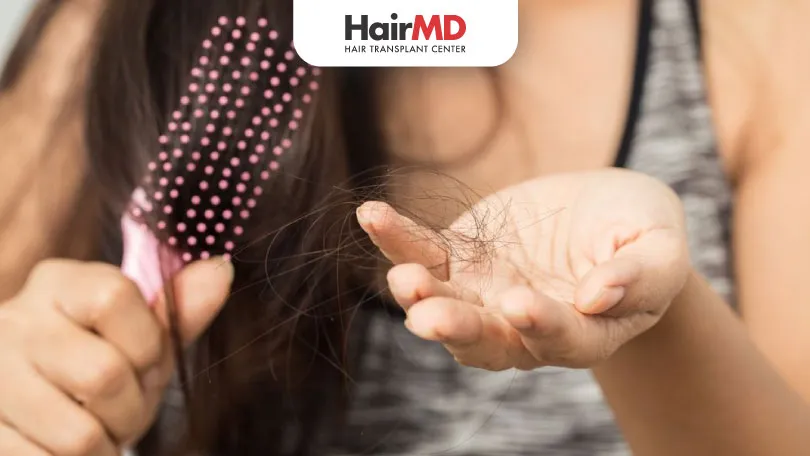29th Dec, 2021

Losing 50-100 strands of hair each day is completely normal and part of the hair’s natural growth cycle. This cycle has three phases: growth, rest, and fall. However, sometimes factors like stress, diet, or environmental changes can disrupt this balance, leading to more hair loss than usual. Many wonder if daily habits, such as combing, contribute to this.
In this blog, we’ll explore whether combing your hair can actually cause hair loss and share some helpful tips to keep your hair healthy. Keep reading to find out more!
What’s covered in the article?
- Benefits of Combing Hair
- Hair Combing Mistakes Leading to Hair Loss
- Conclusion
Benefits of Combing Hair
Combing hair is a necessary practice to maintain the good health of the hair. Below are a few benefits of brushing the hair-
Improves Blood Circulation
When you use a wooden comb with blunt teeth, the blood circulation on the head improves. It stimulates the sebaceous glands responsible for releasing the sebum and promoting the distribution of sebum/oil, promoting hair growth and making them stronger.
Exfoliates Scalp
Hair combing exfoliates the scalp and, removes all the old hair dead skin cells, and makes the scalp and hair clean.
Maintains Frizz and Shape
Using the right comb makes hair look voluminous and maintains the frizz. Using a hairbrush facilitates keeping hair tidy.
Hair Combing Mistakes Leading to Hair Loss
Combing hair is good for maintaining a healthy scalp. However, hair loss problems due to combing can arise due to the following mistakes:
Brushing Wet Hair
Brushing hair right after a shower can lead to hair loss as the hair is prone to maximum damage when wet. Use a towel to dry out your hair, and then use a comb with wide teeth to detangle your hair.
Frequent Hair Bushing
Aggressively brushing hair frequently can lead to traction alopecia. This hair problem arises due to frequent hair pulling by combing hair rigorously. The hair loss problem can be reversed once you switch to using a comb with wide teeth and brushing once or twice a day.
Sharing Comb
You must never share your comb, even with your family members. Sharing a comb can spread several diseases, such as – lice etc. All these might damage your hair and eventually lead to hair loss.
Brushing Your hair in Wrong Direction
You should always brush your hair from top to bottom, i.e., downward. Brushing your hair from bottom to top would tangle your hair and lead to hair loss. Reverse combing also leads to hair damage and hair loss and hence should not be done.
Not Cleaning Your Comb Regularly
Keeping the comb clean plays a very important role in maintaining hair growth. A dirty comb brings all infections that lead to hair loss.
You must comb your hair using the right brush to keep your hair from falling. Visit an expert dermatologist if you see signs of excessive hair loss.
Do You Know?
Nearly 250 Patients Visit HairMD
Everyday For Various Hair Concerns?
(Your journey to healthier and fuller hair starts here!)
Meet Our Dermatologists
Conclusion
In conclusion, combing your hair the right way can promote healthy hair and scalp. It’s important to avoid common mistakes like brushing wet hair or using a dirty comb, as these can lead to hair loss. Always use a wide-tooth comb and brush gently to keep your hair strong and reduce damage. If you’re facing excessive hair loss, it’s best to consult a dermatologist for expert advice.
Further Reading
How Much Hair Loss is Normal for Teenage Male?
Understand normal hair loss in teenage males and when it may signal an issue. Visit HairMD Pune for expert advice on teenage hair health and treatment options.
Is Hair Loss One of the Side Effects of Using Glucosamine?
Explore potential risks & benefits of this supplement for joint health. Get the facts on hair loss & glucosamine use.
Top Kitchen Ingredients to Boost Hair Growth
Discover the best kitchen ingredients for hair growth! Use coconut oil, onion juice, aloe vera & more to nourish your hair naturally and reduce hair fall.
How to use Minoxidil and Dermaroller together?
Boost hair growth with Minoxidil & Dermaroller! Learn the right technique, benefits, and mistakes to avoid for thicker, healthier hair.
Have thoughts? Please let us know
We are committed not only to treating you, but also educating you.











